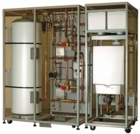Is this the ultimate in condensing technology?

Does producing commercial-scale domestic hot water using 48% less energy than current best practice appeal? And we are not talking about solar thermal, which is only 26% less, but a technology that achieves a further 30%. We got the full story from Chris Farrell, independent technology advisor for Remeha Commercial and MD of Zenex Technologies.
Shortly after Chris Farrell had invented a passive flue-gas heat recovery system that he called GasSaver he realised its potential for considerably reducing the energy needed to produce domestic hot water compared with other approaches. His company, Zenex Technologies, commissioned an independent consultant, AC & T, to estimate the costs of a range of different systems for a household of four people.
There is a lot more detail about how much hot water was used and at what temperatures, but suffice it to say that the figures were compatible with the British Standard recommendations.
The annual cost for the current best practice of condensing regular boiler and cylinder was £197 a year, at the gas and electricity prices of the time.
The cost for a non-storage combi boiler with a GasSaver unit was 48% less at £102.
Even a theoretically perfect gas system came in at £114 a year.
Surprising, perhaps, was the cost for a condensing boiler with twin-coil solar store and evacuated-tube solar collectors — at £145 a year.
Not content with making those figures generally available, Zenex subsequently commissioned TUV NEL, formerly the UK National Engineering Laboratory, to review the work of AC & T.
GasSaver technology has become recognised as an energy-saving category within UK Building Regulations, and the Energy Saving Trust recognises GasSaver under its Energy Saving Recommended Scheme
The concept was pursued on a domestic scale, but it was towards the end of last year that Remeha Commercial and Zenex formed a partnership to apply the technology on a commercial scale. The Quinta Eco Plus and Aqua systems made its public debut at an exhibition in London last October, and the display unit was reportedly snapped up for installing in a nursing home in Hampshire.
So how does the concept work?
The first stage of the Aqua system is to extract the maximum amount of heat from the flue gases using the Zenex GasSaver/Eco Plus passive flue-gas heat recovery system. The GasSaver/Eco Plus provides a full-time condensing boiler system, even at high primary temperatures. An important aspect of the GasSaver is that it acts as a thermal store for 6 l of condensate. Incoming mains water is preheated by this thermal store to at least 30°C.
During off-peak operation this preheated mains water is blended with cold water to reduce its temperature to 30°C. The advantage of this temperature is that a boiler with flow/return temperatures of 75/55°C will readily raise its temperature by 35 K to 65°C using a plate heat exchanger. Also, note that the return temperature to the boiler of 55°C permits condensation of the flue gases.
Chris Farrell indicates that a 115 kW boiler in an Aqua unit will deliver off peak 42 l/min of hot water at about 50°C. A boiler of that size will have four GasSaver units above it.

During periods of peak demand such as the early morning and early evening in a hotel, a temporal thermal store can be used to increase the flow to 72 l/min of hot water at 60°C. Higher flow rates can be achieved by either connecting multiple systems together or through tailored system designs (see diagram).
The first stage is for the water that is preheated by the GasSaver unit to be blended with cold water down to 30°C. This water is then heated by the thermal store via a plate heat exchanger. Whatever the temperature of the hot water is at that stage is then reduced to 30°C by blending it with cold water before finally being heated to 65°C by the boiler/plate heat exchanger combination.
Chris Farrell explains that the thermal store is only needed to handle periods of peak demand and can be cold the rest of the time to avoid standing heat losses. The thermal store is heated just before the start of the peak period, and a 115 kW boiler will heat a 250 l thermal store to 70°C in about eight minutes and, ideally, should be exhausted by the end of the period of peak demand. Chris Farrell suggests that such a system could serve a small hotel with 20 bedrooms.
If all that sounds complicated, it has been made simpler by Remeha Commercial bringing it all together in a packaged unit comprising boiler, GasSaver/Eco Plus units, storage vessel, plate heat exchangers, pumps and control equipment.
The concept is scalable, and because units are preconfigured and tested before delivery, the changeover from an existing systems can be achieved quickly with little downtime.
Because the flue gases can be quite cool, on average 20 K above ambient, uPVC tubes can be used for flueing.
How long will it take to get your money back from the energy-cost savings? The TUV NEL report has some data on that question based on a hot-water system for a home.
The comparison is made with replacing an existing non-condensing boiler with a cylinder.
Going the renewable-energy route with a condensing regular boiler and solar thermal with a twin-coil solar store would have a 20-year payback period.
The simpler arrangement of a non-storage combi boiler with a GasSaver unit would have a much shorter payback period of 10 years and, as indicated earlier, save much more energy. Also, commercial customers with large hot-water demands can expect to recover their energy saving investment in under two years.
The simple trick is to wring much more heat of the flue gases through condensation to retrieve more energy than can be provided by solar-thermal systems — especially bearing in mind their electrical demand for ancillary equipment such as pumps.







